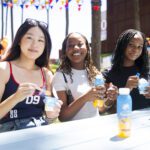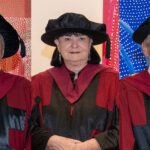A Curtin University Western Australian School of Mines (WASM) graduate is the founder of the first Masaai night school in East Africa, where he spent seven months building infrastructure in some of the most impoverished communities in the world.
Having graduated from WASM with a Bachelor of Mining Engineering more than three years ago, Kyle De Souza has worked in Perth as a mining consultant and deputy project manager in an underground mine, before joining Rock Team, Australia’s newest underground mining contractor, where he currently works as a mining engineer.
Mr De Souza’s work in Kenya began at the Shade Riruta Orphanage in Nairobi, where he was joined by volunteers Lakota Mikulicich and Helen Haby, who helped to build a new classroom for children who had been abandoned or whose parents had died from AIDS or starvation.
Mr De Souza said after a month at the orphanage, he received a phone call from community members requesting his skills in woodwork, engineering and project management to assist the building and completion of a school in the Maasai Land.
“The Maasai Land is the term used to describe the area of land in the Great Rift Valley where Maasai people still live relatively traditionally,” Mr De Souza said.
“Here we started the first Maasai men’s education program which allows men who herd cattle during the day to get an education at night. We run schools for them during the day, between 8am and 4pm, and night classes between 6pm and 10pm, and currently have more than 40 students enrolled in the program.
“Some of the students have to walk up to 2.5 hours each way to get to school, but regardless of that, they always show up; they are that keen on learning and making something of their lives.
“We have also started a women’s program which seeks to empower women by giving them the skills to sew their own clothes and sell them. The women normally do bead work all day, so we are working on starting a website, called United Maasai, where we help to market the products produced by these women internationally.”
Mr De Souza said the Maasai school was expected to be completed before Christmas, and would include essentials such as electricity, a library extension, concreted floors, windows, lockable doors, tables, chairs and hygienic areas for children to eat.
“The school now has 45 students and two full time teachers, and we are registered with the Kenyan government as a Community Based Organisation,” he said.
“Mining engineering is the broadest engineering discipline of all. The technical and practical knowledge from labouring underground for two years and working as an engineer for that time gave me the tools to undertake building a school and managing the project work associated with it.
“When the challenge was set to start a school dedicated to Maasai men, I thought to myself, ‘if I can start a mine, I can start a school’.”
Mr De Souza said practical aspects of the school construction were also used to teach students how to cut wood, use a ruler, as well as teaching them addition and subtraction to figure out measurements to apply to their own future work.
An interest in the bigger picture and being aware of the wide range of impacts mining can have on a community have also contributed to Mr De’Souza’s work in Africa.
“Sustainability is such a big part of mining and I wanted to see how the poorest people are affected by bad policy,” he said.
“Africa is a minerals rich continent, and I honestly believe that if we are to help the people there we need to understand from a first-world management perspective that we are accountable for our actions around the globe.
“As the generation that will hopefully lead the changing face of the globalised minerals market, I wanted to educate my peers about exploitation, bridging the poverty gap and really making a difference to people’s lives.”
Kyle De Souza’s family immigrated to Australia from India in 1995 and share a long-standing involvement in charity work.
Contacts:
Andrea Barnard, Public Relations, Curtin University
Tel: 08 9266 4241, Mob: 0401 103 755, Email: andrea.barnard@curtin.edu.au



